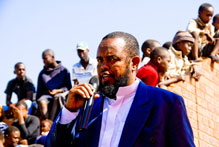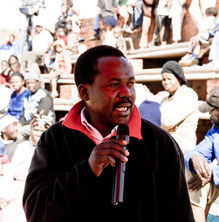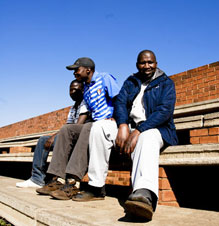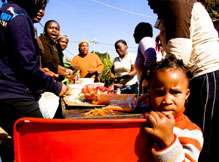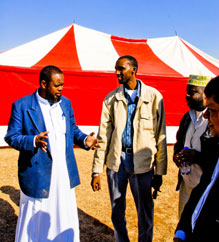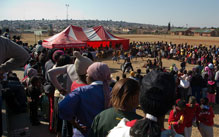
Crowds watch on at the Makhaza Stadium in Atteridgeville
July 19, 2009 – The community of Atteridgeville near Pretoria celebrated Mandela Day yesterday with a reconciliation event, during which South Africans and foreign nationals publically forgave one another for the xenophobic violence that occurred last year.
About 200 people gathered at the Makhaza Stadium in the informal settlement of Jeffsville to listen to community leaders reconcile their differences, along with dancing, singing and lunch.
The idea for the event came out of a June 20 Community Conversation where a member of the community apologised to migrant members of the community for the violent xenophobic attacks that occurred in the area in February and March 2008.
In turn, Somali Association of South Africa (Sasa) Chairman Abdul Hassam offered to slaughter a cow and offer it to the people of Atteridgeville as a gesture of forgiveness and reconciliation.
“When people come to the table and they eat together, it is easier to relate to one another,” said Hassam. “A hungry mouth is an angry mouth.”
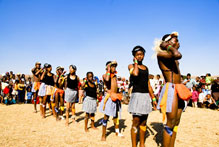
Dancers entertain the crowd
The cow was slaughtered the previous day, and the community ate it yesterday, on Mandela Day.
According to Hassam, 19 Somali shops were looted and one Somali was killed in the area in the 2008 attacks.
Ernest Tshavhuyo, secretary general of the Atteridgeville Civic Organisation (ACO), remembers that time well. The ACO helped to calm the xenophobic violence in the area, using its modest offices as a place where disputes could be settled.
“As soon as you get into this yard,” he said, pointing out the small perimeter, “there is no beating.”
He described the organisation as a “jack of all trades” – helping community members with issues ranging from family violence to getting an ID book from Home Affairs, all the while challenging government to deliver much-needed services to the community.
At the time of the attacks, “as leadership [we asked ourselves] what can we do so that such horrible attacks don’t happen again?”
Tshavhuyo remembered. The ACO founded a broad peace forum with local NGOs, political parties and the police, and held meetings every week to discuss issues. “Then at last peace began to prevail.”
Speaking to community members gathered for the function, Tshavhuyo reminded them that foreigners helped liberate South Africa.
“Most of the anti-apartheid leaders were harboured in these countries. We used to sing the Lusaka Lusaka. I see no reason why as South Africans today, we have to act in this way. Madiba taught us reconciliation is the only source of humanity.
“I, as a person, on behalf of the South Africans, apologise on their behalf. We as ACO, we are saying we are sorry, [for] what has happened. We are saying to you Zimbabwean people, Mozambiquan people, Congolese people, Zambian people, and nations which I didn’t mention, we are sorry.”
Hassam accepted the apology. “We have received this apology and on behalf of the refugee community, I am saying we have forgiven you also.”
“As the leader of the Somali community, whatever you need from us, we are ready to assist.”
“This [event] is a good idea. To fight is not going to help us with anything,” said Reilas Chiloane, watching on from the single grandstand at the ground.
“At the end of the day we are all the sons and daughters of God, we are all Africans, we have to fight poverty together.”
Prince Dube, a Zimbawean, said: “Everyone is enjoying themselves, I’m feeling happy. I don’t think the violence will happen again.”
Abdi Ebrahim, a Somalian, said, “How did our fathers solve problems? When any problem happens, we sit under a tree, discuss our differences and we come to reconciliation. How can we take the same message to the rest of South Africa?”
Tshavhuyo motivated for the establishment of a commission of enquiry to investigate the perpetrators of the violence, in order to ensure a lasting peace. “These perpetrators need to say themselves, what they did on that day. He or she needs to formally apologise.”
See the exclusive photo gallery here.
